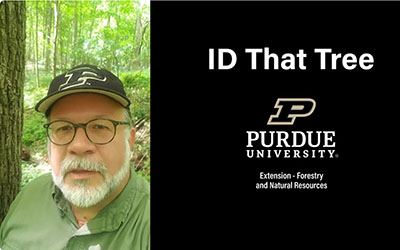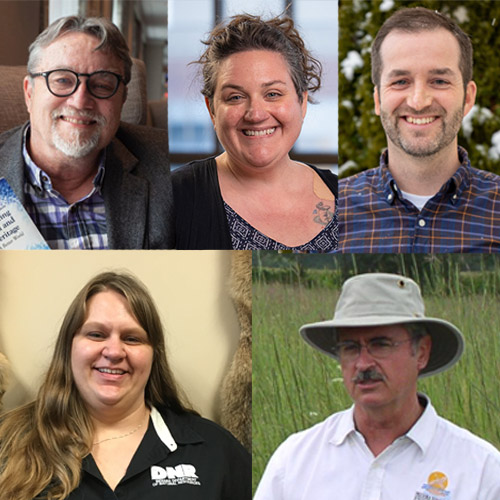FNR Faces in the Crowd: Lara Santiago-Sacarello
“The more that you learn, the more places you’ll go.” – Dr. Suess
Lara Santiago-Sacarello came to Purdue due to its science-based curriculum after becoming acquainted with the university through 4-H experiences on campus and through her father Luis, a Purdue extension specialist in Daviess County. The Washington, Indiana, native received an emerging leaders science scholarship and made plans to major in genetics, which she “fell in love with the moment she learned about it.”
Guided by her love of the beach, the ocean and sharks, Lara is now a senior double majoring in genetics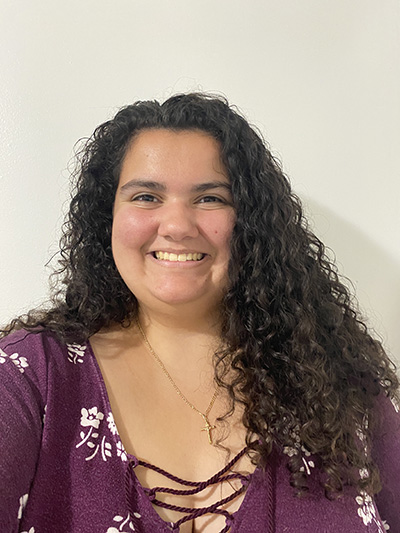 and aquatic sciences, reasoning that “if I didn’t take the opportunity to pursue something else I was interested in, I would regret it in the long run.”
and aquatic sciences, reasoning that “if I didn’t take the opportunity to pursue something else I was interested in, I would regret it in the long run.”
Although her career path is still undecided, Santiago-Sacarello gave herself more options over the past 18 months, opening her mind and preparing for the future through a variety of experiences. From spending a semester studying abroad in Australia to interning for the oyster farm industry in Maine to gaining hands-on career training at Purdue Forestry and Natural Resources’ Marine Biology Practicum in Seahorse Key, Florida, each has taught her lessons for a lifetime.
“If you see an opportunity, take it, regardless of whether you think it's going to fit into your degree, because you are going to learn a bunch of new skills. You also might find out you like something more than something else,” Santiago-Sacarello says looking back on her Purdue journey thus far.
This past summer opportunity came knocking through a job posting she found in a marine career connections Facebook group she is a part of. The position with Minorities In Aquaculture (MIA) had just extended its application deadline and Lara applied. She worked at a fish hatchery near her home in Washington, Indiana, for a few weeks at the start of the summer, harvesting walleyes and delivering and releasing them into local lakes, before moving in to her job as an oyster farm intern in Maine.
“I had never worked on an oyster farm and I had never been to Maine. Why not try something new on top of something new?” Santiago-Sacarello said of her decision to choose Maine among the location options she was given by MIA founder Imani Black, an African American oyster farmer.
Minorities in Aquaculture aims to bridge the gap between minority individuals aspiring to build careers in aquaculture and the industry's workforce development needs, requirements & goals through the program. The organization’s website states “We believe that by educating underrepresented demographics about the environmental benefits that aquaculture provides, we can create a more diverse and inclusive aquaculture industry.”
As part of her internship, Santiago-Sacarello worked with Nauti Sisters Sea Farm and Lanes Island Shellfish Company, performing a variety of duties for each.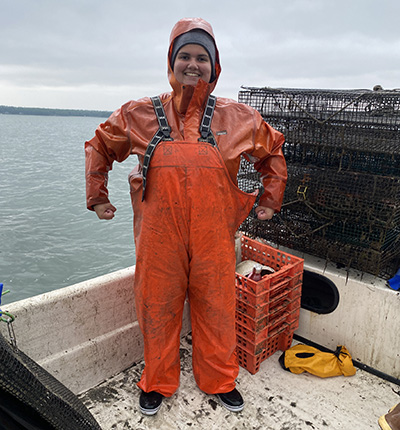
At Nauti Sisters Sea Farm, a female-owned company founded by Alicia Gaiero and her sisters, Lara pulled cages from the bottom of the water, cleaned and sorted oysters and maintained equipment. Cleaning the oysters meant removing sponge and barnacles as well as disconnecting those that had grown together. Cleaned oysters were then sorted by size into floating cages and bags where they could filter out the mud they had been sitting in. Lara also harvested oysters, which she describes as “sitting in a boat, finding the right sized ones, cleaning them and counting them.”
At Lanes Island, a small, woman-owned oyster farm in Casco Bay run by Amanda Moeser, Lara experienced the completed world of oyster farming from making oyster bags from scratch to shucking oysters to educational outreach.
“Amanda dragged me along to whatever she was doing as I was staying at her house,” Santiago-Sacarello said. “She took me quahogging, where you literally go and pick clams from the water, which was really fun. I also got to shuck oysters at events she had, which took some getting used to, but was a good time. Amanda also does a lot of outreach with the Native American tribes in Maine, helping them relearn the skills and techniques their ancestors used. I enjoyed getting to see how she interacted with the tribes.”
The admiration was mutual between Moeser and Santiago-Sacarello.
“I'm so lucky to have connected with Lara through MIA this past summer,” Moeser shared. “Lara is a super sharp, daring, kind, goofy and accepting person. She managed to complete summer classes, including a rigorous stats class, while also doing extremely physical work sun up to sun down on the water. Typical oyster farm tasks include things like building and tending gear, usually floating bags, picking oysters, counting and sorting oysters, etc. She was tremendously helpful this summer and I was sad to see her go.”
In addition to skills related to aquaculture during her internship, Lara learned to drive a boat in weather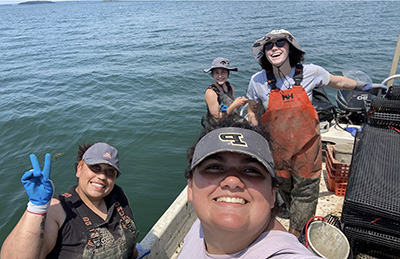 conditions from rain to fog, as well as how to make any job fun.
conditions from rain to fog, as well as how to make any job fun.
“I loved it all, but especially anytime we were on the boat,” she said. “I loved being on the water, whether it was pulling up oyster cages, cleaning oysters or sorting them. I think the company that I was with really helped because it didn’t matter what we were doing, we were laughing and doing whatever it took to make the time fly while doing the job. It was a very rainy summer and we worked in the rain and the fog, so I learned how to work in close encounters with people and take drab days and make the most of them and still have a good time. I also learned a lot from the more tedious things that had to be done like dealing with the gear and equipment, because we don’t really deal with oysters here in Indiana.”
Both positions not only taught Lara the ins and outs of the shellfish aquaculture industry, but also connected her to the community of local business owners in aquaculture.
“The industry there is small, but they get together a lot to support one another,” Santiago-Sacarello explained. “I learned about mussels and even eel as well as oysters. The people there wanted to teach you and were happy to connect you to somebody who might help you learn more. The community was very welcoming. I got to go to aquaculture potlucks where everybody in the industry or who is interested in the industry is invited and brings something they farm from oysters to lobster, crab, eel and scallops. You get to try a lot of seafood and also see the other side of the industry, from a chef to an influencer whose job is educating people about the aquaculture industry.”
In addition to her job mentors, Lara also was able to interact with Minorities in Aquaculture founder Imani Black, who visits all of her interns each year. In addition to talking with Black, Santiago-Sacarello and other interns were able to interact at an aquaculture barbecue and go sea kayaking.
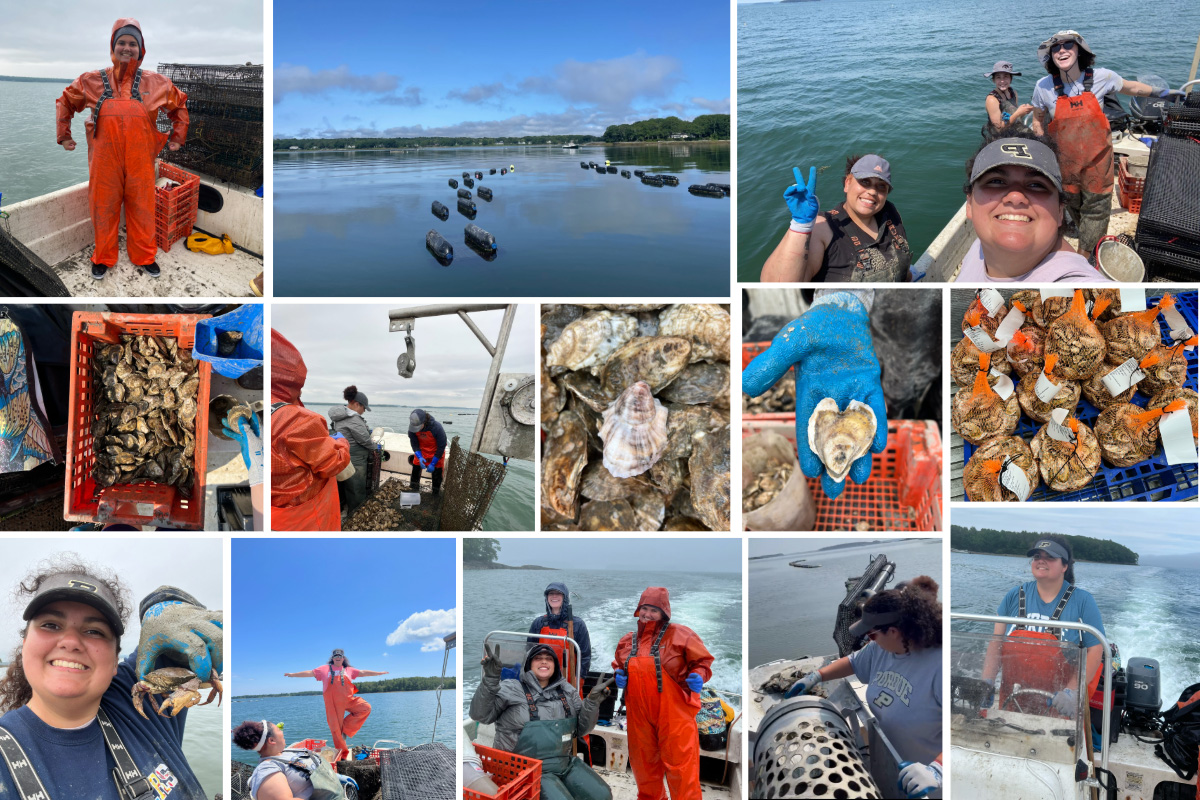 A collage of images from Lara's summer as an oyster farm intern in Maine. Top row (left to right): Lara in her rain gear on the boat; the floating cages, upside down in the water so the oysters are still in the water but closer to the surface; Lara with her crew on the boat: farm manager Amy Gaiero, Taja Harper, a PhD student at the University of New Hampshire, and Candance Power, an intern through the Maine Career Catalyst program. Row 2: The set up for hand-sorting oysters on the boat; the team sorting through a bottom cage of oysters. Over winter the oysters are sunk to the ground and in the early spring and summer, they are pulled back up, cleaned of barnacles, sponges, etc., and transferred to floating bags.; A photo showing the contrast between a cleaned oyster and those just harvested and rinsed; a perfectly imperfect oyster; Oysters ready to be delivered- 100 per orange bag. Row 3: Lara holds a crab; Lara does some casual yoga on the boat; Lara and the crew in the rain and fog; Lara pushing oysters into the tumbler, which sorts the oysters by size and helps to shape them; Lara driving a boat.
A collage of images from Lara's summer as an oyster farm intern in Maine. Top row (left to right): Lara in her rain gear on the boat; the floating cages, upside down in the water so the oysters are still in the water but closer to the surface; Lara with her crew on the boat: farm manager Amy Gaiero, Taja Harper, a PhD student at the University of New Hampshire, and Candance Power, an intern through the Maine Career Catalyst program. Row 2: The set up for hand-sorting oysters on the boat; the team sorting through a bottom cage of oysters. Over winter the oysters are sunk to the ground and in the early spring and summer, they are pulled back up, cleaned of barnacles, sponges, etc., and transferred to floating bags.; A photo showing the contrast between a cleaned oyster and those just harvested and rinsed; a perfectly imperfect oyster; Oysters ready to be delivered- 100 per orange bag. Row 3: Lara holds a crab; Lara does some casual yoga on the boat; Lara and the crew in the rain and fog; Lara pushing oysters into the tumbler, which sorts the oysters by size and helps to shape them; Lara driving a boat. Just hours after completing her internship, Santiago-Sacarello attended Marine Biology Practicum in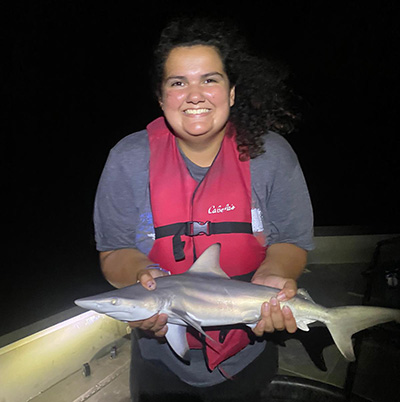 Florida, which enabled her to apply some of the skills she learned oyster farming, while also learning new skills.
Florida, which enabled her to apply some of the skills she learned oyster farming, while also learning new skills.
“I think my internship strengthened my communications skills, so I was able to make connections faster even though I didn’t know most of the people at Practicum,” she said. “I was able to understand some things faster at Practicum because I knew why we did certain things because I had done them earlier in the summer. I also learned a lot of fishing techniques that I had never done before. It was always a triumph when I was able to figure something out. I caught a lot of fish, including a shark, about a foot and a half long, when we went night fishing, which was a highlight.”
Another highlight in Santiago-Sacarello’s time at Purdue was a semester abroad in an exchange program at the University of Western Australia in Perth in 2022. While there, Lara took courses varying from wildlife conservation to fisheries biology, microbiology and women’s health, because she “was in a new country, so why not?” She also gained field experience capturing quendas, marsupials she describes as “oversized rats that are cuter than that and similar to opossums.”
Her time in Australia also included visits to Rotnest Island, where the quokkas, or selfie animals, are. According to The Nature Conservancy Australia, Quokka selfies have become popular with tourists since tennis star Roger Federer and a Quokka starred in a government advertising campaign for the island and Australian actor Chris Hemsworth shared his Quokka selfies online.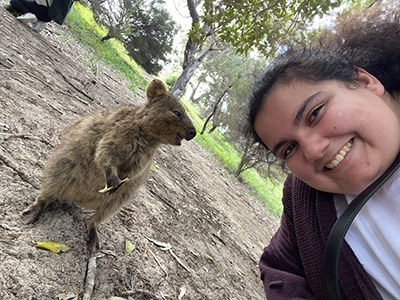
Santiago-Sacarello also visited the zoo, which features different animals than those in the United States, as well as the Margaret River, which she says is like the wine valley of Western Australia, but also includes honey, coffee and chocolate tours. She also spent time along the Swan River, which was “absolutely breathtaking.” All in all, Lara said her study abroad experience was “really mind blowing” and “indescribable with the things you learn, the places you can go and the people you meet.”
In addition to her experiences of the last 18 months, Lara also has been involved in numerous organizations and centers during her Purdue career, many that connect her to her culture. She is part of the multi-cultural sorority Delta Phi Mu. She is on the executive board of the Multicultural Greek Council and will become the organization’s president in the spring of 2024. She is a part of Boilers in Action, which aims to make a positive impact in the local and global community through service events, education and meaningful relationship building. She also is a mentor for the Avanzando College program through the Latino Cultural Center.
“I didn’t really have the chance to connect with my Puerto Rican culture outside of my family where I grew up, so I think representation is really important,” Santiago-Sacarello shared. “If I see somebody like me, I have more drive to pursue what I want to do, so I’m hoping to create more of that for other Latinas and other minorities in general. In the world that we live in, it is important to make sure that we have the power and drive to take up space and be proud of our culture rather than feeling the need to hide. I had my identity crisis, thinking that I didn’t really grow up in Puerto Rico so I didn’t feel like I was 100% Puerto Rican. I always say I don’t know if I have the right to talk about this, but I am making the effort so that others can follow along and hopefully have an easier time.”
Before graduating in fall 2024, Santiago-Sacarello will receive hands-on training in field work and aquatic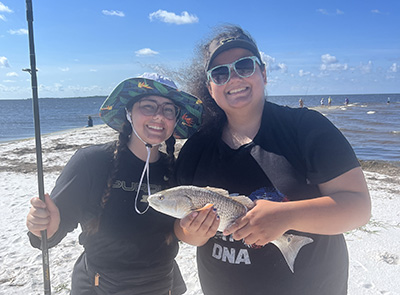 sciences at FNR Summer Practicum in the Upper Peninsula of Michigan next summer. She also has plans to gain more career experience wherever she can find it to continue expanding her horizons and professional network.
sciences at FNR Summer Practicum in the Upper Peninsula of Michigan next summer. She also has plans to gain more career experience wherever she can find it to continue expanding her horizons and professional network.
“My career path is not really laid out yet, but I know long term I would love to work with sharks through shark research or some type of ocean conservation research,” Santiago-Sacarello explained. “This summer definitely opened the door to shellfish aquaculture and I can definitely see myself going into that, even just for the short term. It is just another avenue I’ve started to explore a bit more. We will see what happens.
“I know I want to go to graduate school, but I don’t want to go right away. I’ve already been applying for internships for next summer, looking for something else new to try. You never know where you are going to make connections. In the meantime, while I am trying to figure out what’s next, I am just trying to finish strong.”
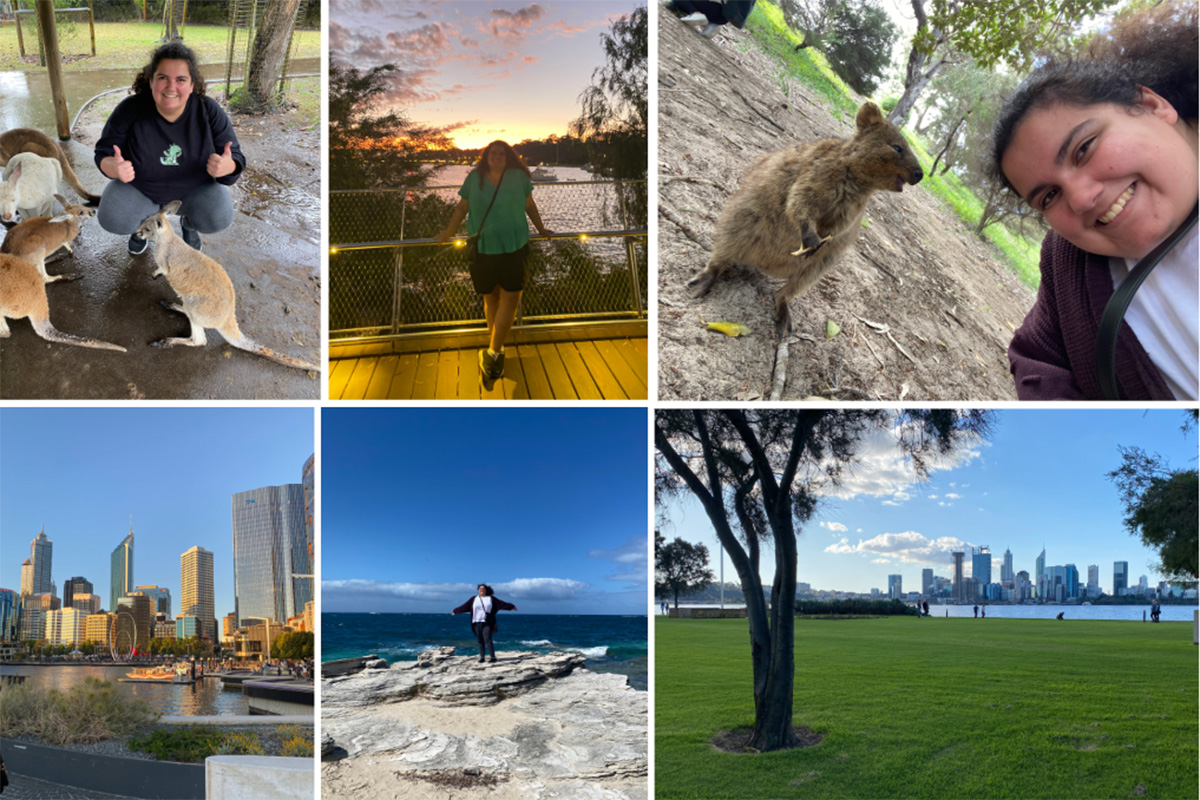 A collage of photos from Lara's semester abroad in Australia. Top row (Left to Right): Lara with a wallaby at the Perth Zoo; Lara standing in front of the sunset on Elizabeth Quay Bridge; Lara takes a selfie with a Quokka on Rottnest Island. Row 2: A bay in Perth, Western Australia; Lara standing with her arms outstretched on Rottnest Island next to the water; A view of Perth from across the Swan River.
A collage of photos from Lara's semester abroad in Australia. Top row (Left to Right): Lara with a wallaby at the Perth Zoo; Lara standing in front of the sunset on Elizabeth Quay Bridge; Lara takes a selfie with a Quokka on Rottnest Island. Row 2: A bay in Perth, Western Australia; Lara standing with her arms outstretched on Rottnest Island next to the water; A view of Perth from across the Swan River. 



